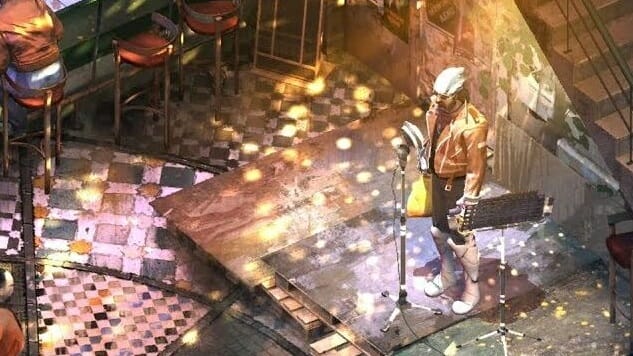
It’s cliche, but brilliant, to write a detective as an alcoholic. The investigation process of gathering and interpreting clues to solve a crime is not unlike piecing together a night lost after getting blackout drunk. It’s fitting that the protagonist of Disco Elysium, the amnesiac Harry DeBois, investigates two major mysteries simultaneously during the game: the murder of the man hanging in the hotel yard, and the events leading to his loss of memory. He is the walking definition of “making it up as you go along.” Throughout the story, as he interrogates suspects and possible witnesses, his bizarre non-sequiturs and left-field responses are a constant embarrassment, both to his professional partner Kim Kitsuragi and himself. His desire to atone and elucidate the past is only exacerbated by his nihilistic internal dialogue and its faithful ability to be more antagonistic and critical than any of the people he meets during the case. At times, with its alternating between cruel and cajoling, its as if his inner life is a separate character itself. Harry gets away with a lot, and yet, he doesn’t get away with anything.
A good RPG gives its mechanics weight by supporting and facilitating multiple story paths. Disco Elysium’s complexity offers that narrative divergence in the form of Harry’s inner dialogues. There are many voices running lines within his head; some are independent, with devastating observations amplified by the isolation of their delivery, while others bicker like siblings at the dinner table. Many serve a practical narrative purpose and are only available with the right alignment of character attributes. But there’s a primal antagonism to each aside, no matter what trait prompts it. Harry’s observations as he interrogates witnesses and embarrasses himself mirror a darker side of my relationship with myself. It’s smirking and judgmental, snide, and self-satisfied, somehow detached as a third party observer even as it knows Harry more intimately than he knows himself. It knows him better because it’s willing to admit what Harry won’t, a self-reflection that can only be couched in interrogation, with a brutality that buffers a cognitive dissonance even in its honesty. It’s the sort of repentance that would redeem Harry if it wasn’t weaponized as another form of self-abuse. At most, it keeps the audience close, even as Harry’s behavior is profoundly alienating.
I don’t necessarily like Harry, but I get him. You can’t help but pity him for his complete lack of restraint. For me, that pity extends to a protective instinct, because, like me, Harry can’t hide his dysfunction. When he stood, almost weeping, dressed in a wretched ensemble of black mesh, bowtie, lab coat and wingtip shoes as he sang karaoke in front of the cafe, I felt a sense of camaraderie. I wanted to comfort him, as if to say, it’s okay Harry, I am also a mess, and no one understands me or my motivations either. I, too, have a choir broadcasting my faults to the rest of my brain in perfect, four-part harmony.
At the very least, Harry has the decency to feel shame and bears no entitlement towards the forgiveness he doesn’t deserve. It doesn’t make him a good person, but it does mean he’s not a bad guy. I may not terrorize innocent villagers or skip out on hotel bills, but I know what it’s like to be too ashamed to look at the monster in the mirror. I also know what it’s like to carry the guilty resignation and quiet defeat of having a long path to redemption ahead of you. Whether Harry achieves his redemption is up for interpretation; a tornado is still a tornado, even if it doesn’t mean to wreck everything in its path. But I’m empathetic towards his journey towards self-awareness, and the heartbreaks along the way. It may not always be healthy or entirely sincere. But Harry’s smirking self-antagonism is a defense mechanism I can understand.
Holly Green is the assistant editor of Paste Games and a reporter and semiprofessional photographer. She is also the author of Fry Scores: An Unofficial Guide To Video Game Grub. You can find her work at Gamasutra, Polygon, Unwinnable, and other videogame news publications.